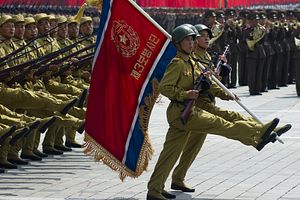Japan has lodged a protest with North Korea after the latter fired two ballistic missiles early Sunday morning (JST) into waters separating the two countries.
The missile test continues a series of launches in recent months, which have drawn international criticism. In the middle of last week, Pyongyang fired two short-range ballistic missiles into the Sea of Japan, albeit launching them somewhat unusually from its western province of Hwanghae.
The Sunday launch, again involving short-range ballistic missiles, were also from an unusual location: Kaesong, just 20 kilometers from the military demarcation line and better known for its proximity to the joint industrial complex North Korea runs with South Korea. According to Yonhap, a South Korean military official says the launch may have been in response to the arrival of the USS George Washington, a nuclear-powered aircraft carrier, in the port of Busan ahead of joint military exercises later this month with South Korea and Japan.
The missile test comes at a time of mixed signals on North Korea’s regional relations. On the one hand, Pyongyang has allowed a surprisingly significant relaxation of tensions with Japan, through bilateral talks on the abductee issue. Those talks recently produced an agreement in which Tokyo would lift some sanctions in exchange for Pyongyang’s commitment to investigate the fate of Japanese citizens believed to have been abducted by North Korea in previous decades. The abductee issue has long been a particularly sensitive topic for Japan and a priority issue for Prime Minister Shinzo Abe.
As my colleague Clint has noted, that success left open the possibility of expanding the scope of the talks.
On the other hand, there has been a noticeable cooling in recent months in North Korea’s relations with China, traditionally its only friend in the region. One factor appears to have been the execution late last year of Kim Jong-un’s uncle Jang Song-thaek, who had been China’s go-to man in North Korea. The friction has apparently led to increasingly heated North Korean rhetoric directed at China, and resulted in considerable speculation surrounding Xi’s decision to break with tradition and visit Seoul earlier this month before making a visit to Pyongyang.
Yet even as China appears to be distancing itself from its troublesome neighbor, Pyongyang has enjoyed some outreach from Russia, which included a visit to Pyongyang by Russia’s deputy prime minister in late April and an agreement to forgive 90 percent of Soviet-era loans extended to North Korea. Russia has a strong interest in developing pipeline and rail links into the Korean peninsular.
Amid all this diverse diplomacy, Pyongyang’s predilection for launching missiles may well be another reminder to its neighbors that they ignore and isolate it at their peril. But with each firing of missiles or bout of angry rhetoric, North Korea tests the law of diminishing marginal returns.
James Pach is editor of The Diplomat.

































